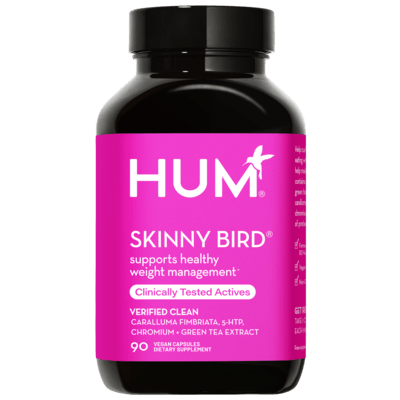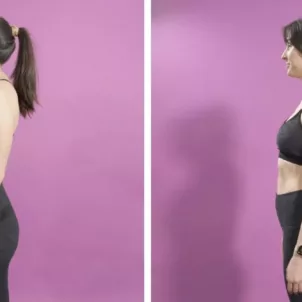Scales, be damned.
It’s a familiar scenario: You’ve been eating clean, killing it at the gym, and getting plenty of sleep. In other words, you’ve got your health routine on lock. Then you step on the scale to track your progress… and you’re not losing weight. *Cue the emotional equivalent of having a bucket of cold water dumped on you.* It’s incredibly discouraging, and can be enough to send you seeking solace in your hidden Oreo stash. (Guilty!)
Many things can contribute to the number on the scale: the time of day, the amount of carbs you’ve consumed recently, where you are in your cycle, and more. Plus, a pound of muscle is much more dense than a pound of fat. So if you’re losing fat and gaining muscle, the scale may not reflect that you’re getting slimmer. Oftentimes your weight isn’t even an accurate way to track your progress. After all, there’s so much more to health than how much you weigh. Case in point: the below photo.
Ditch the Scale
That’s Kelsey Wells, the blogger behind My Sweat Life. She’s eight weeks postpartum in the photo on the far left. After gaining weight during her pregnancy, Wells was self-conscious and struggling with her self-esteem. So she turned to Kayla Itsines’s uber-popular BBG program and got to her goal weight of 122 pounds (the middle photo). For the uninitiated, BBG stands for Bikini Body Guide. It focuses on 28-minute workouts that require little or no gym equipment. The last photo shows Wells 18 pounds heavier than her goal weight, and only five pounds less than her starting weight. Honestly, she looks amazing in all three photos. But in the last one, you can tell she’s much more toned and that her body composition has seriously changed. “According to my old self and flawed standards, I would be failing miserably. THANK GOODNESS I finally learned to start measuring my progress by things that matter — strength, ability, endurance, health, and HAPPINESS,” she writes in her Instagram post. #Preach. The takeaway: Do not (repeat: DO NOT) get hung up about the number on the scale. Your self-worth isn’t dependent on your weight. Also, your weight definitely shouldn’t be the only way you track your health and fitness. While the scale can be a useful tool, it doesn’t paint the whole picture and can ultimately hinder your quest to find your happy weight.Better ways to track your progress
1. Take Before & After Photos
Even if the scale doesn’t budge, chances are your photos will tell a different story. Photos provide a concrete, visual way to see your progress and compare where you are currently to where you started. (See above photo for more proof.)2. Measure Yourself
You can absolutely drop inches even if your weight remains the same (or even increases). Use a tape measurer to measure your waist, hips, thighs, and biceps. Aim to measure yourself once every week to two weeks. Always measure at the same time of day; otherwise, your results can get skewed. Pay particular attention to your waist size. Studies have shown that even if you’re at a normal weight, carrying extra weight in your abdomen can increase your risk of type-2 diabetes, cardiovascular disease, and death. A Harvard study found that women with a waist size of 35 inches or higher had three times the risk than women with a waist size under 35 inches. Why? Because the fat in your abdomen (aka visceral fat) releases fatty acids, inflammatories, and hormones that can trigger higher levels of bad cholesterol, blood sugar, and blood pressure. That’s why we ask you for your waist size when you take our quiz; it helps our nutritionists make recommendations tailored for you.3. Know Your Fitness Milestones
Not everything is about body composition. Instead, focus on all the cool things you can do now that you couldn’t do a month (or even a week) ago. If you could only do three push ups, and you can now do 10, celebrate that! Did you beat your deadlift PR? Heck yeah! Take a moment to revel in how awesome that is. Seeing accomplishments away from the scale can help you stay motivated.4. Track Everything in an App
All that data you just compiled? Stick it in an app. While you’re at it, use the app to track your meals and snacks to get a comprehensive look at your health and wellness on any given day. That way you can reference your diet and make tweaks to improve your performance. Plus, a 2013 study found that tracking your progress on a mobile device was more effective than tracking on paper. We recommend MyFitnessPal, Lifesum, and Noom Coach.More like this









